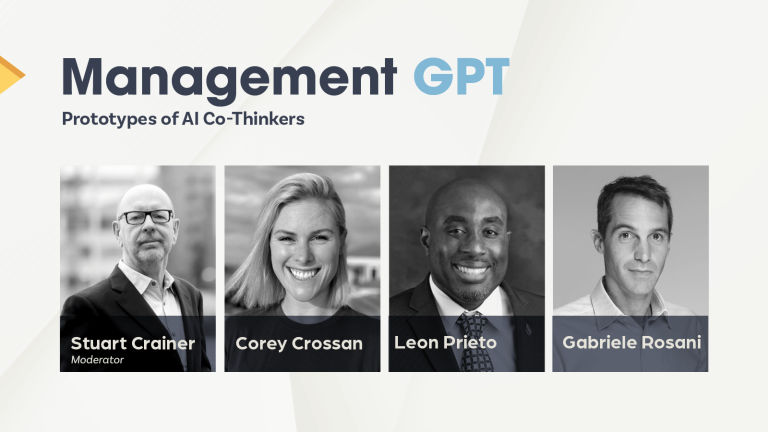
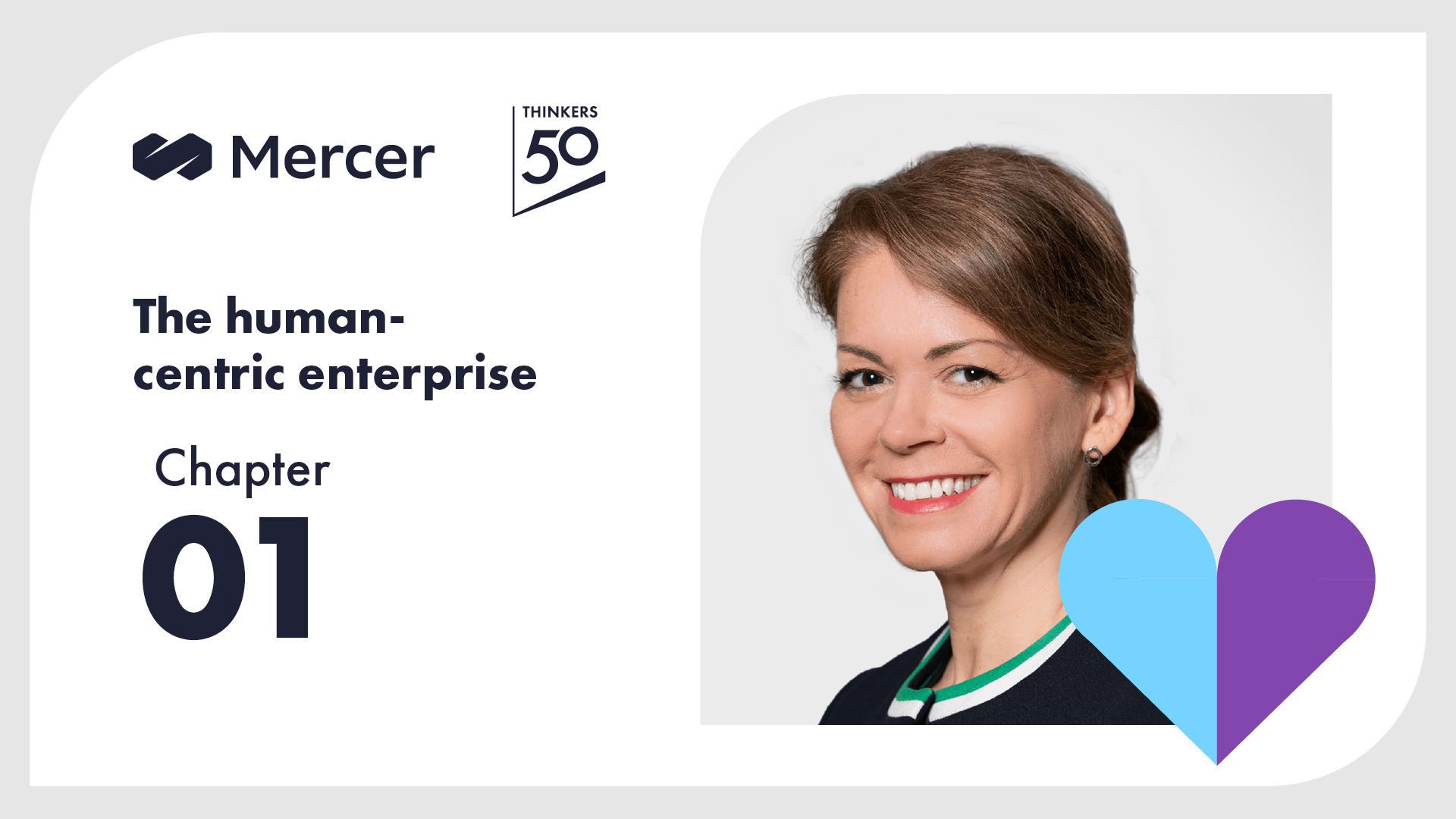
The Human-Centric Enterprise ebook is the result of a partnership between Thinkers50 and Mercer. The subject is close to our hearts at Thinkers50: understanding how to manage and lead organisations in the most humane way — in a way which truly maximizes the amazing variety of human potential.
With contributions from Mercer experts, The Human-Centric Enterprise portrays a working world in which best practice is being realigned to accord with the needs and aspirations of people rather than balance sheets or restrictive notions of efficiency. It acknowledges the powerful evolution of amazing technologies, but places them in the human context, as enablers of human achievement rather than replacements for people.
Kate is a senior partner and Mercer’s Global Advisory Solutions and Insight Leader. She has worked in Asia, Australia, the US, and Europe helping organisations achieve a talent advantage through their people.
In her current role, she supports Mercer’s thought leadership agenda, knowledge management and colleague sales enablement. She also leads on solution innovations for the HR buyer and colleague learning in the Talent, Reward and Transformation practices. She has held office, practice and market leadership roles at Mercer. Before her current position, she was the Career Global Practices Leader and, prior to that role, served as the Growth Market Regional Practice Leader for Talent Strategy and Organizational Performance.
Kate is the author of Mercer’s annual Global Talent Trends Study and speaks regularly on the future of work. She is currently partnering with the World Economic Forum under their Good Work Alliance project to define Good Work standards and metrics. She is a non-executive director of Digital Frontiers.
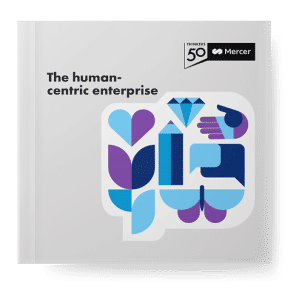
As the future of work rapidly evolves, we must urgently reassess our understanding of where, how and why we work.
Developed by Mercer and Thinkers50, The Human-Centric Enterprise redefines our perspective on putting people at the centre of modern workplaces.
How well do you know the people in your organization? What do they worry about? What matters to them? How well do they know you and your values?
Questions like these used to seem trivial. Leaders were the experts, and employees were to follow their lead and earn results. Personal morals, cares and dreams were beside the point. But now, as we deliver on the future of work, they are exactly the point. The values of company leaders can shape the future of the entire organization.
In early 2020, Mercer partnered with the World Economic Forum (WEF) on the future of work agenda — which, unbeknownst to us, was about to come to a sudden halt. The pandemic’s impact on discussions at the WEF was dramatic. No longer was the conversation dominated by AI and automation. The impact on jobs, health and well-being took center stage; as we leaped from a digital crisis to a health crisis, we also saw a reset in how people interacted across traditional divides.
Tapaswee Chandele, Global VP of Talent & Development for The Coca-Cola Company, put it beautifully when she said after the pandemic that the company’s leaders were inspired to “step back and reflect on ‘what have we actually learned about our workforce? What have we learned about what people want from their life and from their careers?’” She added that they had examined the role of a leader in the future and realized that “it’s about moving away from being a director of tasks to being an enabler of dreams.”
Today, winning organizations are delivering on that vision. They relate to their employees not only as workers but also as stakeholders in the company’s success. And as employees continue to be more enterprising, enterprises become more human. Becoming this kind of human-centric, relatable organization is key to engaging and retaining talent in the people age.
If you’d seen it in a film, would you believe how much the workplace has evolved over the past few years?
One remarkable truth of our collective pandemic experience is that despite the fact that we spent much of it six feet apart, our workplaces actually brought us closer together. Coming out of this period, Mercer’s Global Talent Trends research showed that trust in organizations was soaring. People were highly optimistic, seeing a once-in-a-lifetime opportunity to rethink their relationships with work — and, indeed, with one another. Employees contemplated new questions: Where and how do I want to work? What does work actually mean to me? How does my work impact the world?
During the pandemic years, we got to know our organizations more intimately than ever — warts and all. Leaders had shockingly candid conversations about safety, pay and protocols. Workers openly compared their experiences at different firms. Organizations deftly balanced empathy with economics, and leading companies were already thinking about how to cultivate more sustainable workplaces. What we didn’t realize at the time was that these human-centric values would reset the future of work agenda forever.
There is an idea in science called punctuated equilibrium, which posits that evolutionary change is not slow and steady but comes all at once in short, dramatic bursts tied to specific events. We saw this sort of change in the past few years as society fundamentally shifted and work changed with it. Employees began to feel seen as equal stakeholders in their companies’ futures and began to hold their employers to a higher standard.
In 2020, 54% of Americans said they would quit if their employers did not speak out about racial injustice. More recently, 75% of Gen Z consumers in the US and UK said they were likely to consider finding a new job if they felt misaligned with their employers on key social issues. It’s therefore no surprise that in Mercer’s Global Talent Trends research, a company’s reputation jumped from 7th position in 2021 to 2nd in 2022 as the reason people joined the company.
The same research showed the importance of flexible working, with more than one-third of employees saying they would forgo a pay increase in exchange for more flexibility in hours and/or work location, better benefits, and additional time off. In 2023, remote job postings on LinkedIn continue to draw an increasing number of applications.
Organizations have adapted to these changing expectations as they seek to retain talent in a more human- centered way. Relatable organizations are already innovating to meet demand for both job security and flexibility. At Unilever, the U Works program provides talent with stable income while offering the chance to explore other opportunities outside the organization. Workers retain their permanent status — with pensions, healthcare and benefits, and a minimum income — but also contract back for work inside the firm. Unilever Chief Talent, Learning and Rewards Officer Placid Jover explains that “you can say: ‘I work for Unilever. I am a permanent Unilever employee.’ But at any point in time you could be actively working for another company with another business. You could be setting up your own company.”
The people-driven future of work that for so long has been waiting in the wings is finally taking flight. In this new reality — which we call the people age — the robots have not come for our jobs, nor has the corporate machine destroyed humanity. Instead, AI and automation are helping to usher in new ways of partnering with technology and with one another. And organizations are committing to a deep and much-needed focus on health, well-being and sustainable ways of working.
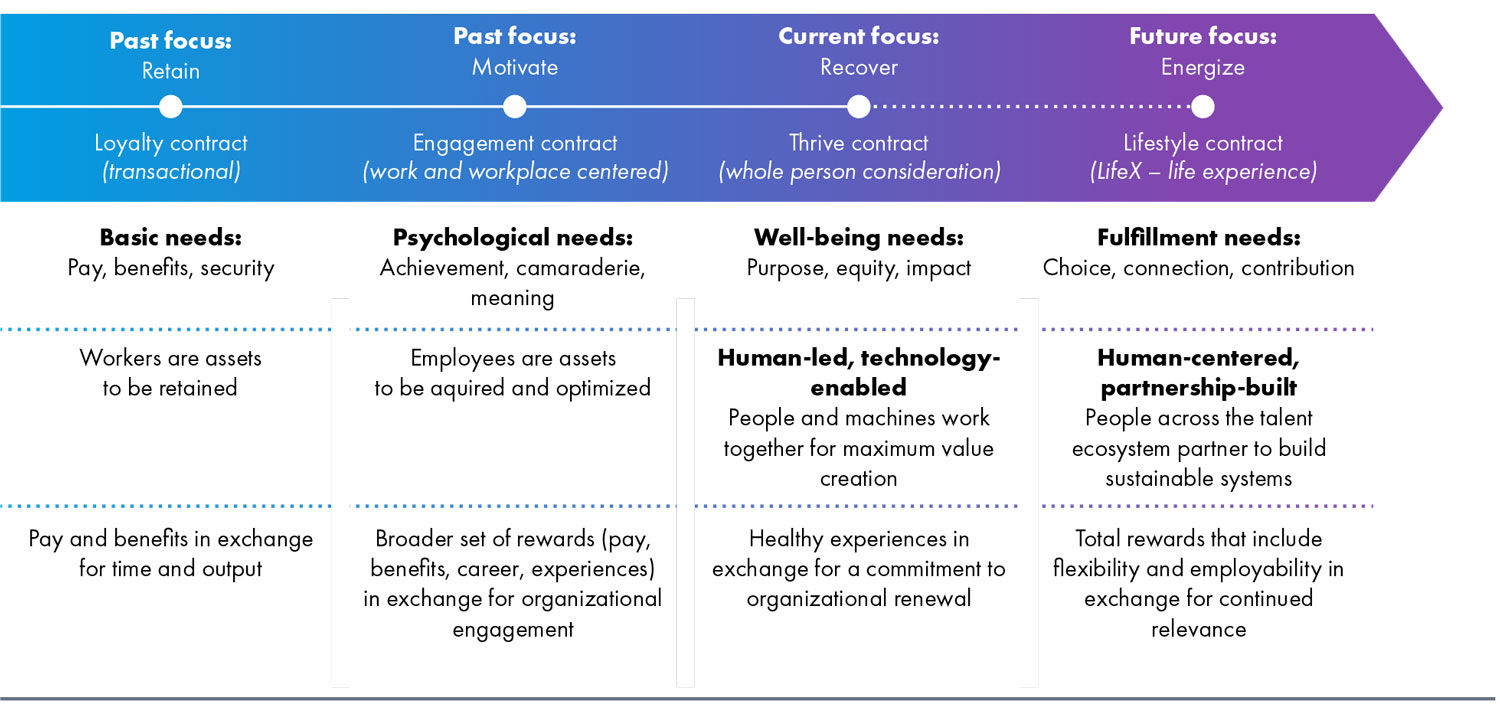
As we emerge from the pandemic period, people around the world are burned out, stressed out, financially pressured and emotionally drained. Gen Z, in particular, is both hungry for change and highly attuned to well- being as recent work from Oliver Wyman has shown. Companies have been forced to rethink how they meet employee needs.
Tripti Jha, Chief Talent and People Solutions Officer at Novartis, sums it up like this: “Well-being is a responsibility, it is not a benefit … Well-being needs to be out front of how the work is organized in an organization.” She adds, “How you feel is as important as how you perform, because the two are deeply connected.”
Organizations are responding with the “thrive contract,” which takes a whole-person perspective — focusing on employee health and well-being needs in return for a healthy and productive workforce.
This has largely replaced the more unidimensional “engagement contract,” which dominated in the early 2000s and placed the focus on work and the workplace. We are also now seeing the seeds of the “lifestyle contract” as workers seek to respond to the intertwining of their work and lives and enter a real dialogue about what they want from their employment arrangements.
Employees of all generations are no longer willing to sacrifice today for a brighter tomorrow; they want things to be better now. The organizations that act with humanity and create more human-centered workplaces will win in the people age. This is the spirit behind the Good Work Framework that launched its associated metrics at Davos in January 2023 — encapsulating the learnings from the WEF’s CHRO community with which Mercer proudly partnered in defining the new world of work. The Good Work movement urges companies to lead with their values and set bold ambitions around the “S” in their environmental, social and governance (ESG) agendas — all in pursuit of raising the bar for a value-driven, equitable and human-centric future of work.
The framework has key objectives for organizations that want to lead the charge on staying relevant, responsible and relatable. It proposes a series of metrics and reporting guidelines to galvanize these commitments into action. Companies such as Randstad, Schneider Electric, Unilever and Marsh McLennan — some of the Good Work Alliance members — are making efforts in a range of areas. These include upskilling and reskilling programs, flexible work options across the organization, ensuring pay equity, and providing a living wage.
Many companies are also weaving Good Work into their employee value propositions. This trend aligns with Mercer’s recent Global Talent Trends Study finding that employee experience would be one of HR’s top priorities in 2023. Now, 37% of HR leaders are actively designing work with well-being in mind (for example, realistic workloads, no-meeting days, reduced complexity, positive work environment, culture of trust, etc.). Of these, 46% are enabling workers to take paid time away from work for everyday life activities (such as doctors’ appointments and child school events). And 67% are building a culture in which employees feel comfortable bringing their authentic selves to work.
As Atrayee Sarkar Sanyal, VP of Human Resource Management for Tata Steel, noted on the launch of the Good Work initiative, “There comes a time for major breakthroughs in the way work, the workforce and the workplace undergo a threshold change. I think the time is now, with the pandemic and Industry 4.0 giving us the opportunity to reorganize ourselves. We will need to realign our strategy, systems and structures with changing realities. The new work philosophy will be embedded in agility and flexibility together with empathy.”
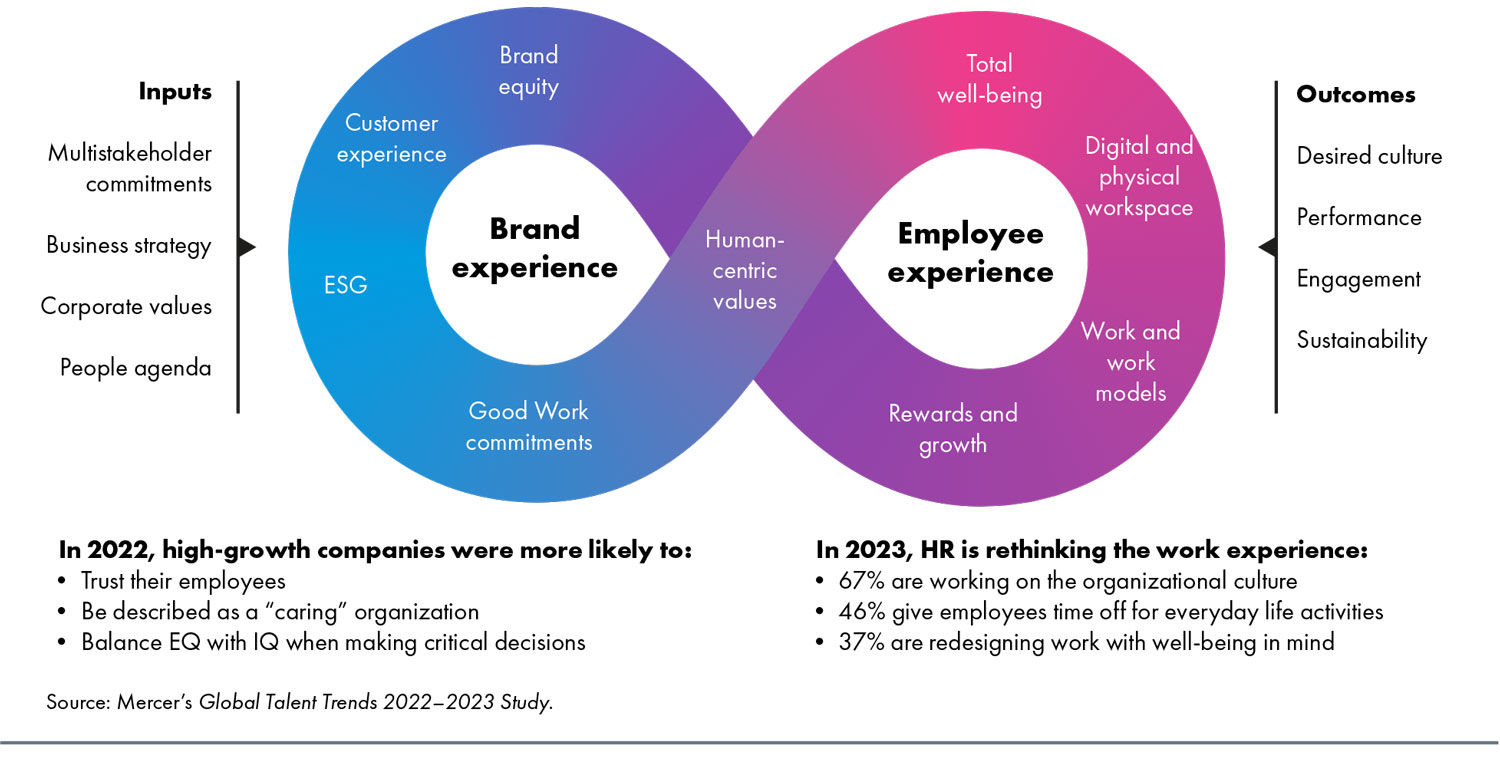
Mercer’s 2023 Global Talent Trends research highlighted what sets top companies apart from the rest, not just in terms of financial results but also in helping employees thrive. These leading organizations were striving to be more relatable in five important ways. Relatable organizations are:
Relatable organizations are always in listening mode. This effort takes many forms, from employee listening to external research to workforce analytics. Understanding stakeholder needs is crucial to remaining relevant and building resilience into the organizational fabric. Companies that don’t listen could seem tone-deaf in today’s transparent world.
Ask yourself these questions to gauge your own listening efforts:
Relatable organizations are not afraid to come off mute on their values. This is not just about public commitments to causes and values; it’s also about backing commitments up with tangible actions and continued progress. But for trusted brands, trying and failing to meet those commitments is often less damning than staying silent.
Here’s a quick check to help ensure you’re on track:
Relatable organizations prioritize a “learn everything” culture over a “know everything” culture. This means democratizing access to data while both promoting and funding experimentation.
Want to foster a “learn everything” culture? Consider the following:
Relatable organizations let their employees lead from the front. The future of work agenda is certainly being accelerated by the next generation, who will be its inheritors. Opening up strategy formation as well as strategy execution has a magnifying impact on engagement.
As you work toward a better partnership with your workforce, ask yourself:
Becoming a human-centered, relatable organization often requires several things: a philosophical reset of how we view the people that contribute to our company’s success, a recognition of our true purpose, an understanding of our entity as an organization with agency, and a vision of the impact we wish to have on the world. Today, businesses are grappling with labor shortages. In fact, one in two executives feel they don’t have sufficient talent to meet the demand for their organizations’ products or services. We are also challenged by lack of talent agility; only 33% of executives believe they can effectively scale up and down to respond to market volatility. What is painfully evident is that those that do well by employees, contractors, vendors, their customers and their shareholders are the least likely to suffer these crippling talent shortages.
Delivering on this task takes intentional design and a willingness to balance economics and empathy in decision-making. As we wrestle with continuing economic and social crises, the seeds of discontent are beginning to creep back in as real wages decline, gaps in social expectations continue and companies revoke promises around flexibility. But as long as organizations — and their leaders — act with humility and not hubris, these headwinds will not set us back. The trust that organizations will do right by their workers and society is at an all-time high. If we nurture this trust with greater listening, learning and collaboration, we can build a brighter and more sustainable future together.

Thinkers50 Limited
The Studio
Highfield Lane
Wargrave RG10 8PZ
United Kingdom

Thinkers50 Limited
The Studio
Highfield Lane
Wargrave RG10 8PZ
United Kingdom

| Cookie | Duration | Description |
|---|---|---|
| LANG | 9 hours | Linkedin set this cookie to set user's preferred language. |
| nsid | session | This cookie is set by the provider PayPal to enable the PayPal payment service in the website. |
| sp_landing | 1 day | The sp_landing is set by Spotify to implement audio content from Spotify on the website and also registers information on user interaction related to the audio content. |
| sp_t | 1 year | The sp_t cookie is set by Spotify to implement audio content from Spotify on the website and also registers information on user interaction related to the audio content. |
| tsrce | 3 days | PayPal sets this cookie to enable the PayPal payment service in the website. |
| x-pp-s | session | PayPal sets this cookie to process payments on the site. |
| __cf_bm | 30 minutes | This cookie, set by Cloudflare, is used to support Cloudflare Bot Management. |
| Cookie | Duration | Description |
|---|---|---|
| l7_az | 30 minutes | This cookie is necessary for the PayPal login-function on the website. |
| Cookie | Duration | Description |
|---|---|---|
| CONSENT | 2 years | YouTube sets this cookie via embedded youtube-videos and registers anonymous statistical data. |
| _ga | 2 years | The _ga cookie, installed by Google Analytics, calculates visitor, session and campaign data and also keeps track of site usage for the site's analytics report. The cookie stores information anonymously and assigns a randomly generated number to recognize unique visitors. |
| _gat_gtag_UA_10408481_1 | 1 minute | Set by Google to distinguish users. |
| _ga_ZP8HQ8RZXS | 2 years | This cookie is installed by Google Analytics. |
| _gid | 1 day | Installed by Google Analytics, _gid cookie stores information on how visitors use a website, while also creating an analytics report of the website's performance. Some of the data that are collected include the number of visitors, their source, and the pages they visit anonymously. |
| Cookie | Duration | Description |
|---|---|---|
| NID | 6 months | NID cookie, set by Google, is used for advertising purposes; to limit the number of times the user sees an ad, to mute unwanted ads, and to measure the effectiveness of ads. |
| test_cookie | 15 minutes | The test_cookie is set by doubleclick.net and is used to determine if the user's browser supports cookies. |
| VISITOR_INFO1_LIVE | 5 months 27 days | A cookie set by YouTube to measure bandwidth that determines whether the user gets the new or old player interface. |
| YSC | session | YSC cookie is set by Youtube and is used to track the views of embedded videos on Youtube pages. |
| yt-remote-connected-devices | never | YouTube sets this cookie to store the video preferences of the user using embedded YouTube video. |
| yt-remote-device-id | never | YouTube sets this cookie to store the video preferences of the user using embedded YouTube video. |
| yt.innertube::nextId | never | This cookie, set by YouTube, registers a unique ID to store data on what videos from YouTube the user has seen. |
| yt.innertube::requests | never | This cookie, set by YouTube, registers a unique ID to store data on what videos from YouTube the user has seen. |
| Cookie | Duration | Description |
|---|---|---|
| DEVICE_INFO | 5 months 27 days | No description |
| loglevel | never | No description available. |
| m | 2 years | No description available. |
Thinkers50 Limited has updated its Privacy Policy on 28 March 2024 with several amendments and additions to the previous version, to fully incorporate to the text information required by current applicable date protection regulation. Processing of the personal data of Thinkers50’s customers, potential customers and other stakeholders has not been changed essentially, but the texts have been clarified and amended to give more detailed information of the processing activities.